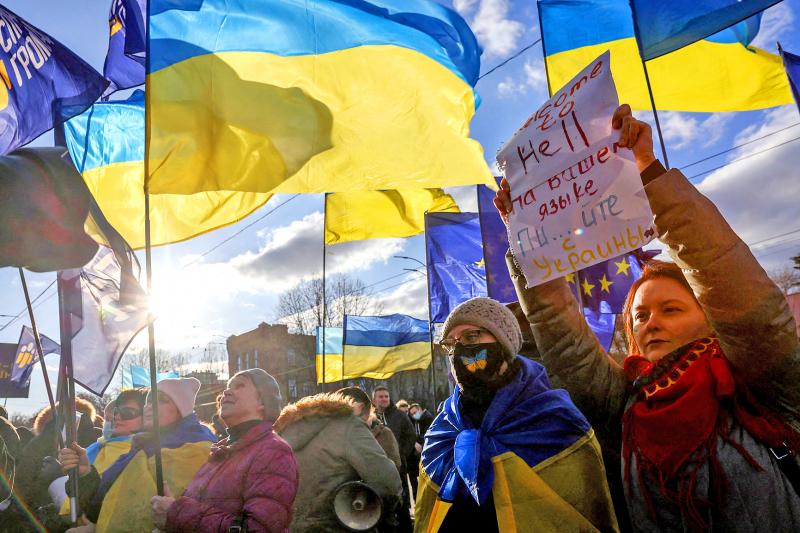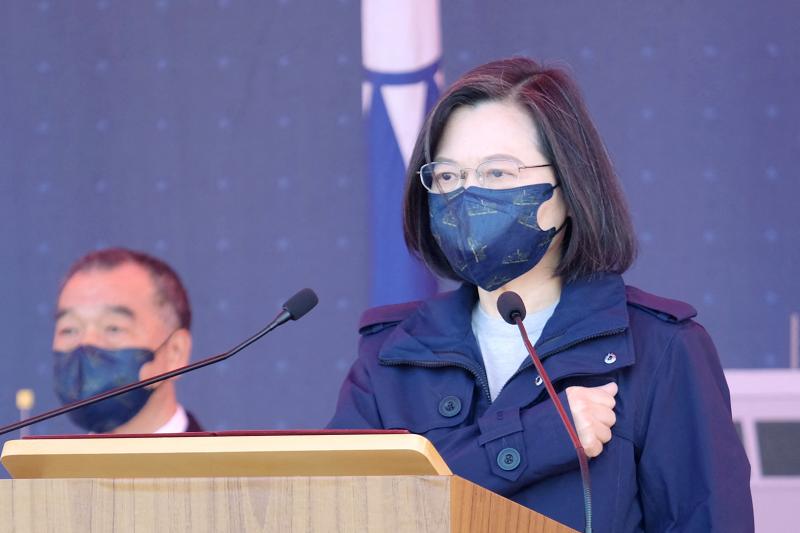Taiwan condemns Russia for undermining Ukraine’s sovereignty and calls for peaceful means to resolve the dispute, President Tsai Ing-wen (蔡英文) said yesterday.
Taipei “condemns Russia’s violation of Ukraine’s sovereignty,” Tsai wrote on Facebook shortly after she was briefed on the latest situation in Ukraine by a National Security Council task force.
The government calls on all sides to use peaceful means to resolve disputes, Tsai said, adding that Taiwan is willing to contribute to de-escalation efforts, although she did not elaborate on what those efforts might be.

Photo: Reuters
Russian President Vladimir Putin on Tuesday officially recognized Ukraine’s breakaway Donetsk and Luhansk regions as sovereign entities.
He also ordered Russian troops into the regions on a “peacekeeping” mission, drawing condemnation from Western governments and international organizations such as the UN and NATO.
The government would continue ensuring the security of Taiwan while keeping an eye on the situation in Ukraine, Tsai said.

Photo: AFP
National security officials and armed forces have been instructed to more closely monitor the situation across the Taiwan Strait and continue to refine their defense readiness, she said.
All government agencies must be on the alert for potential influence operations perpetrated by overseas powers and their local partners that might attempt to use the Ukraine crisis to sway public opinion in Taiwan, Tsai said.
They should step up efforts to clarify false information and prevent its spread, she added.
Tsai also asked the government to prepare for possible short and long-term effects the Ukraine crisis might have on the global and domestic economy, and devise plans to ensure the supply of strategic goods and stabilize commodity prices and the financial market.
On Tuesday, a national security official told the Central News Agency that the nation should be wary of “cognitive warfare” waged by China.
Beijing could use information about Ukraine to plant the idea in Taiwan that the US would not honor its commitment to ensure Taiwan’s security, the official said on condition of anonymity.
Apart from sowing division between Taiwan and the US, such efforts are designed to promote unification with China, the official said.
The situations in Taiwan and Ukraine are not comparable, and the US’ commitment to Taiwan’s security remains firm, the official said, adding that Taiwan occupies a strategic location in East Asia and plays a key role in global supply chains.
A senior Taiwanese official familiar with the government’s security planning told Reuters that the chances of a sudden uptick of military tension are “not high,” but that Taipei has been watching closely for any unusual Chinese activities.
The person pointed to the Chinese People’s Liberation Army’s joint military drills in areas between Taiwan’s northeast and near the Miyako Strait close to Japan’s southern islands, which have become more frequent in the past month or so.
In Beijing, China’s Taiwan Affairs Office spokesman Ma Xiaoguang (馬曉光) yesterday said that Taipei, in concert with the West, was using Ukraine to “maliciously hype up” military threats and whip up anti-China sentiment.
One Western security official familiar with policy planning toward China said that Beijing was most likely looking at how the Ukraine situation developed in terms of sanctions on Russia.
“It’s probably seen as a laboratory by China, on what they might face in a Taiwan contingency,” the official said, referring to how Western countries might react to a Chinese attack on Taiwan.

A Ministry of Foreign Affairs official yesterday said that a delegation that visited China for an APEC meeting did not receive any kind of treatment that downgraded Taiwan’s sovereignty. Department of International Organizations Director-General Jonathan Sun (孫儉元) said that he and a group of ministry officials visited Shenzhen, China, to attend the APEC Informal Senior Officials’ Meeting last month. The trip went “smoothly and safely” for all Taiwanese delegates, as the Chinese side arranged the trip in accordance with long-standing practices, Sun said at the ministry’s weekly briefing. The Taiwanese group did not encounter any political suppression, he said. Sun made the remarks when

The Taiwanese passport ranked 33rd in a global listing of passports by convenience this month, rising three places from last month’s ranking, but matching its position in January last year. The Henley Passport Index, an international ranking of passports by the number of designations its holder can travel to without a visa, showed that the Taiwan passport enables holders to travel to 139 countries and territories without a visa. Singapore’s passport was ranked the most powerful with visa-free access to 192 destinations out of 227, according to the index published on Tuesday by UK-based migration investment consultancy firm Henley and Partners. Japan’s and

BROAD AGREEMENT: The two are nearing a trade deal to reduce Taiwan’s tariff to 15% and a commitment for TSMC to build five more fabs, a ‘New York Times’ report said Taiwan and the US have reached a broad consensus on a trade deal, the Executive Yuan’s Office of Trade Negotiations said yesterday, after a report said that Washington is set to reduce Taiwan’s tariff rate to 15 percent. The New York Times on Monday reported that the two nations are nearing a trade deal to reduce Taiwan’s tariff rate to 15 percent and commit Taiwan Semiconductor Manufacturing Co (TSMC, 台積電) to building at least five more facilities in the US. “The agreement, which has been under negotiation for months, is being legally scrubbed and could be announced this month,” the paper said,

NATIONAL SECURITY THREAT: An official said that Guan Guan’s comments had gone beyond the threshold of free speech, as she advocated for the destruction of the ROC China-born media influencer Guan Guan’s (關關) residency permit has been revoked for repeatedly posting pro-China content that threatens national security, the National Immigration Agency said yesterday. Guan Guan has said many controversial things in her videos posted to Douyin (抖音), including “the red flag will soon be painted all over Taiwan” and “Taiwan is an inseparable part of China,” while expressing hope for expedited “reunification.” The agency received multiple reports alleging that Guan Guan had advocated for armed reunification last year. After investigating, the agency last month issued a notice requiring her to appear and account for her actions. Guan Guan appeared as required,